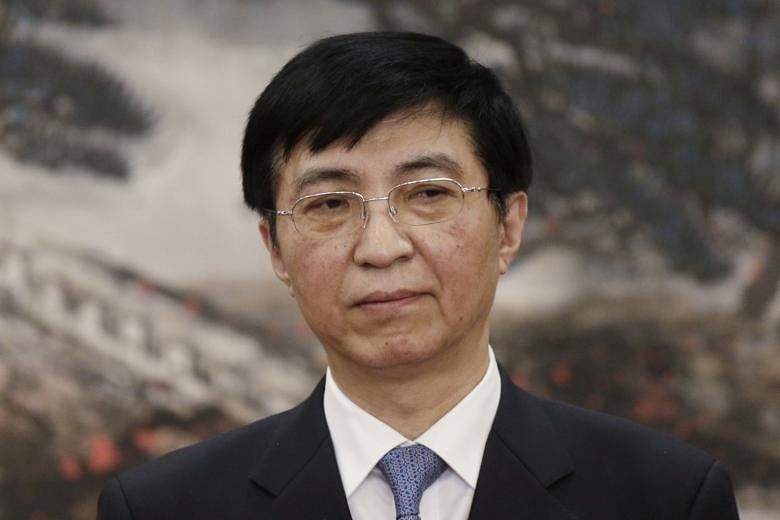For decades, former law dean Wang Huning worked his magic quietly behind the scenes as an adviser to three top Chinese leaders.
The pre-eminent political theorist is said to have played a key role in coming up with Mr Hu Jintao's Scientific Outlook on Development and Mr Jiang Zemin's Three Represents - the duo's signature political ideologies. He is also the brains behind President Xi Jinping's "China Dream" concept, referring to a rejuvenated and powerful China.
But the spotlight is now on the 62-year-old, who has risen to the apex Politburo Standing Committee of the Chinese Communist Party (CCP) without experience in regional party leadership positions.
Instead, he has served mainly as head of the Central Policy Research Office, a party think-tank.
"He may be the most academic Politburo Standing Committee member in the party's history," said East Asian Institute analyst Chen Gang, noting that the CCP usually prefers PSC members to have extensive governance experience in the cities and provinces.
Mr Wang, a former law dean at Shanghai's Fudan University who led its debating team to Singapore for inter-varsity debates in 1993, was plucked from academia by Mr Jiang. But it was under Mr Xi that his political career rose meteorically.
He is Mr Xi's top foreign policy aide, a constant companion on overseas tours and part of his inner circle. With his promotion to the PSC, Mr Wang is likely to take over the portfolio of retired propaganda chief Liu Yunshan, and become secretary of the CCP Secretariat.
-
WANG HUNING, 62
• Ranks No. 5 in PSC.
•Principal Chinese Communist Party theorist and law professor.
•Key architect behind Mr Hu Jintao's Scientific Outlook on Development, Mr Jiang Zemin's Three Represents and Mr Xi's own "China Dream".
In Mr Wang's early writings are treatises calling for the party to focus on high-level corruption.
He is also an ardent advocate of neo-authoritarianism, which holds that strong central authority is needed for economic and social stability, and takes precedence over democracy and individual liberty.
Mr Wang's ideas have clearly influenced Mr Xi, said Beijing-based analyst Jude Blanchette of research group Conference Board.
"We see a consistent theme: Clawing power back to Beijing (and) cadres throughout the country now pay homage to the 'core' of the party's Central Committee, Xi Jinping," he wrote.
Dr Chen said Mr Wang's rise reflects Mr Xi's need for a capable ideologist who can provide the doctrinal heft to his policy agenda.
"We saw this with how Xi Jinping Thought on Socialism with Chinese Characteristics for a New Era and the Belt and Road Initiative were added to the party Constitution, which could be done only by someone intimately familiar with party theoretical work," he said.
Professor Steve Tsang of the School of Oriental and African Studies said Mr Wang is "someone Xi can rely on to provide ideological leadership on his behalf".
He said:"With no power base of his own, he is totally dependent on Xi for his power and office, so Xi can rely on him despite Wang having served Hu and Jiang."


